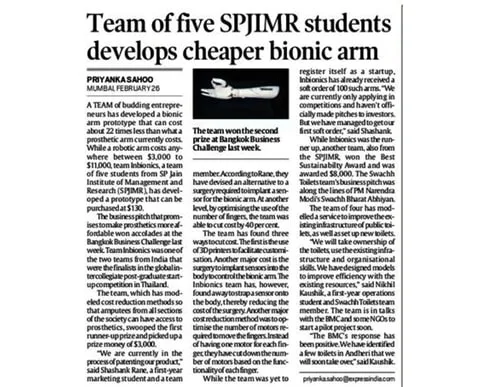Find the programme that meets your requirements and aspirations.
Apply nowAnnouncements
Team of five SPJIMR students develop cheaper bionic arm
February 27, 2017
A TEAM of budding entrepreneurs has developed a bionic arm prototype that can cost about 22 times less than what a prosthetic arm currently costs. While a robotic arm costs anywhere between $3,000 to $11,000, team Inbionics, a team of five students from SP Jain Institute of Management and Research (SPJIMR), has developed a prototype that can be purchased at $130.
The business pitch that promises to make prosthetics more affordable won accolades at the Bangkok Business Challenge last week. Team Inbionics was one of the two teams from India that were the finalists in the global intercollegiate post-graduate start-up competition in Thailand.
The team, which has modeled cost reduction methods so that amputees from all sections of the society can have access to prosthetics, swooped the first runner-up prize and picked up a prize money of $3,000.
“We are currently in the process of patenting our product,” said Shashank Rane, a first-year marketing student and a team member. According to Rane, they have devised an alternative to a surgery required to implant a sensor for the bionic arm. At another level, by optimising the use of the number of fingers, the team was able to cut cost by 40 per cent.
The team has found three ways to cut cost. The first is the use of 3D printers to facilitate customisation. Another major cost is the surgery to implant sensors into the body to control the bionic arm. The Inbionics team has, however, found a way to strap a sensor onto the body, thereby reducing the cost of the surgery. Another major cost reduction method was to optimise the number of motors required to move the fingers. Instead of having one motor for each finger, they have cut down the number of motors based on the functionality of each finger.
While the team was yet to register itself as a startup, Inbionics has already received a soft order of 100 such arms. “We are currently only applying in competitions and haven’t officially made pitches to investors. But we have managed to get our first soft order,” said Shashank.
While Inbionics was the runner up, another team, also from the SPJIMR, won the Best Sustainabilty Award and was awarded $8,000. The Swachh Toilets team’s business pitch was along the lines of PM Narendra Modi’s Swachh Bharat Abhiyan.
The team of four has modelled a service to improve the existing infrastructure of public toilets, as well as set up new toilets.
“We will take ownership of the toilets, use the existing infrastructure and organisational skills. We have designed models to improve efficiency with the existing resources,” said Nikhil Kaushik, a first-year operations student and Swachh Toilets team member. The team is in talks with the BMC and some NGOs to start a pilot project soon.
“The BMC’s response has been positive. We have identified a few toilets in Andheri that we will soon take over,” said Kaushik.

